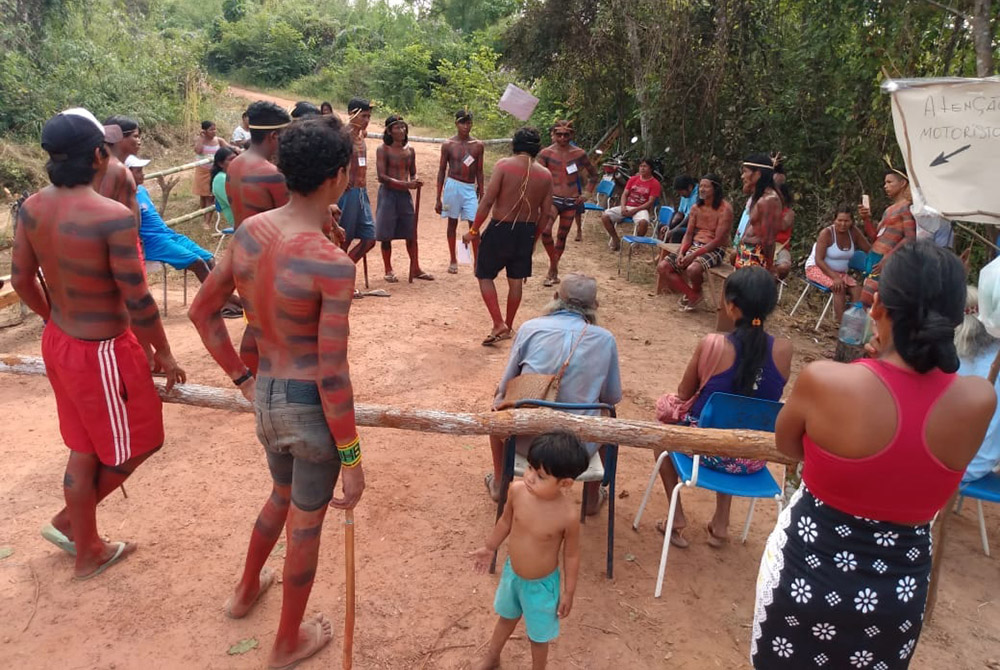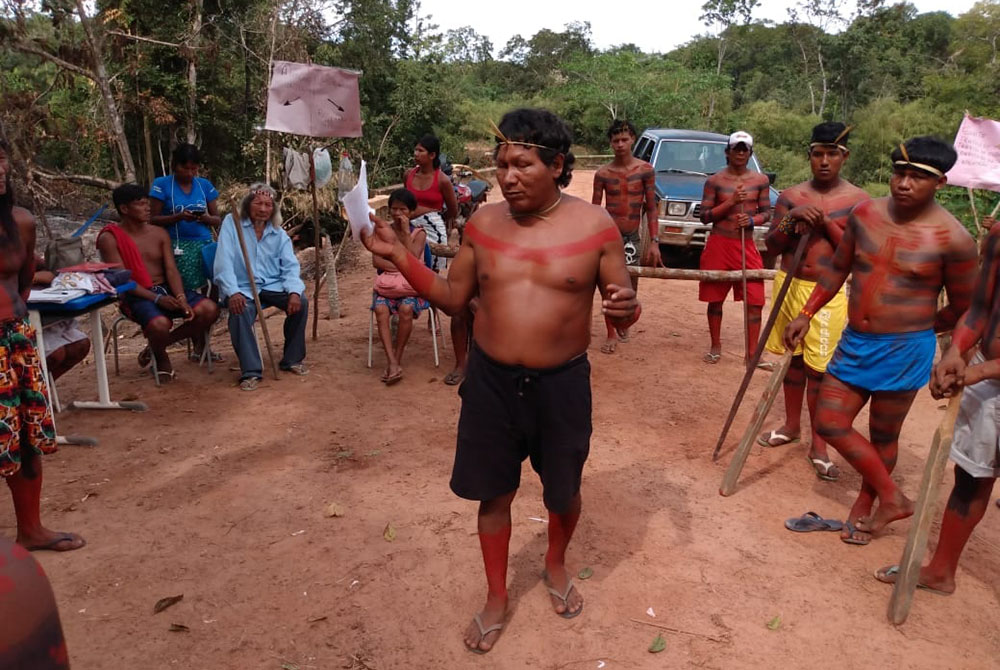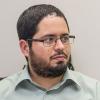
The Krahô People in the Amazonian State of Tocantins implanted physical barriers on the road to their villages in order to prevent the access of people from the outside and avoid contagion. (Courtesy of the Krahô People/Indigenous Missionary Council)
The explosion of cases of COVID-19 in the Brazilian Amazon led the Catholic Church to launch several initiatives to coordinate assistance in the region. Bishops and missionaries working in the Amazonian church acknowledge, nevertheless, that the crisis is too big. For them, it's up to Catholics now to assume a prophetic voice, denouncing the government's negligence in providing health care services to indigenous peoples and the poor.
According to the daily report of the number of victims of the novel coronavirus released by the Pan-Amazon Ecclesial Network (known as REPAM in Portuguese and in Spanish), as of May 19 there have been at least 65,976 confirmed cases of the disease in the Brazilian Amazon, with 3,862 deaths. Half of the casualties occurred in the biggest cities in the area, Manaus (with 1,010 deaths) and Belém (with 861 deaths). But the virus has reached even the most distant communities.
At the end of April, the bed occupancy rate in Amazonas State reached almost 100% and cemeteries couldn't handle the daily number of corpses. The same situation happened in Belém, in Pará State, and in Macapá, in Amapá State. Outside those big urban centers, most people can't count on hospitals in the Amazon to handle complex cases. Smaller cities usually don't have intensive care units and must send patients in serious conditions to the state capitals, overcrowding their systems more and more.
For peasants, riverside communities, indigenous peoples, and quilombolas (descendants of African slaves who fled captivity in colonial and imperial times), COVID-19 isn't the only threat. In fact, the pandemic exacerbated all adversities they have historically faced regarding their lands and their rights.
According to REPAM, there were at least 249 confirmed cases of infection and 70 deaths among indigenous groups in the Brazilian Amazon, which include at least 17 indigenous nations.
"Not only indigenous people who live in the cities are being infected. The virus also reached several reservations," Franciscan Catechist Sr. Laura Vicuña Manso, missionary of the Indigenous Missionary Council of the Brazilian Bishops' Conference, told NCR.
Manso explained that most indigenous peoples in the Amazon need to buy food in the city to complement their diet. That's when they get in contact with the virus. Another reason that is taking them to the cities is a small financial help that the federal government has been paying to the neediest ones in society (corresponding to U.S. $100 per month, for three months).
"In many cases they come, try to withdraw that money and come back to their villages with their hands empty, because there are many problems concerning the government's system. So, they end up being exposed to the coronavirus for no reason," she told NCR.
In São Gabriel da Cachoeira, on the border with Colombia and Venezuela, the indigenous population makes up about 90% of the approximately 45,000 residents. Since April, when the pandemic began in the region, most indigenous communities have closed all accesses to their lands, preventing people from the outside to enter. "That's our advice, radiophonically transmitted to all reservations every day," Marivelton Baré, president of the Federation of Indigenous Organizations of Rio Negro, told NCR.

The Krahô People in the Amazonian State of Tocantins implanted physical barriers on the road to their villages in order to prevent the access of people from the outside and avoid contagion. (Courtesy of the Krahô People/Indigenous Missionary Council)
In an effort to prevent people from leaving their reservations, Baré's federation is distributing food donations in the villages. "But we have been informed that outsiders are getting into indigenous lands. We also know that there's a huge volume of under-notification of cases," he said.
According to Bishop Edson Taschetto Damian of the Diocese of São Gabriel da Cachoeira, when the first cases of COVID-19 hit Manaus, a crisis committee was formed in São Gabriel with the contribution of the diocese. "We tried to avoid that people from other cities came to our region through boat and plane. But clandestine passengers kept irregularly arriving," he said.
Damian explained that most indigenous people have low immunity, due to constant infections of malaria, dengue, and pneumonia. "Therefore, when they're hit by the novel coronavirus, the development of the disease may be serious," he said.
The diocese offered one of its buildings, in the outskirts of the city, to shelter indigenous patients being treated in the urban area of São Gabriel. The local hospital has only seven ventilators and all of them are in use, so additional patients have to be taken to Manaus, 530 miles southeast of the city.
The pandemic has revived a ghost from the past for many indigenous groups, added Manso. In the Amazon, a significant part of the indigenous peoples made contact with the non-indigenous society for the first time only a few decades ago. "It usually provoked great epidemics which killed almost entire villages. That's a strong memory for them, of course," she said.
Besides the disease itself, dozens of indigenous groups are suffering with the invasion and deforestation of their lands by ranchers who want to steal their territory, illegal miners and illegal loggers.
"Those people are taking advantage of the current chaos and doing what they want. The governmental agencies that should inspect and protect reservations suspended their activities due to the pandemic, but the organized crime doesn't abide by the quarantine," Manso said.
Invaders may carry the virus to very isolated peoples, with even lower immunity to respiratory diseases. Their approach usually involve threat, violence, and even the killing of the land's rightful occupants. "We've been in touch with every indigenous leader we know to accompany their situation and to denounce invasions to national and international human rights organisms," she said.
In a similar scenario, the quilombola communities in the Amazon have been terribly hit by the disease. Among 26 quilombolas who died in the whole country, 16 were members of Amazonian communities — eight in Amapá State and eight in Pará State.
The National Coordination of Black Rural Quilombola Communities (known as Conaq, in Portuguese) denounced that the pandemic has been "invisibly spreading through quilombola territories," without "receiving the adequate attention by public authorities." Conaq reported that there's a considerable under-notification of cases.
As the pandemic advances, the attacks against quilombola territories also grow. "Quilombola communities usually preserve their lands, which are still forested. With the monitoring agencies closed, invaders are encouraged to act. Many communities have been denouncing this kind of occurrence," said Maria Petronila Neto, a member of REPAM'S local committee for the Rondônia State.
For other Amazonian communities, the major risks posed by the current crisis involve their material subsistence. Most people in the Amazon live in traditional riverside communities and practice artisanal fishing, selling the surplus of fish in the markets to make some money. "But now this is impossible, because markets are closed. We've been organizing campaigns to donate food to such communities," Bishop José Valdeci Mendes of Brejo, president of the Fishermen's Pastoral Council, told NCR.
In Manaus, where there's a huge homeless population, the local Caritas has been working to minimize hunger and to provide basic hygiene products to people on the street. "We bought 4,000 tons of food from local farmers to distribute among the poor, the homeless, and to indigenous urban people," Deacon Afonso Brito, executive-secretary of Caritas Manaus, told NCR.
According to Brito, the failure of the authorities to establish a complete lockdown and the continuous circulation of people through the city will probably make the pandemic grow over the next few weeks. "The analysis of (Manaus) Archbishop Leonardo Steiner is that it's not getting to the end any time soon," he said.
On May 18, REPAM and the Pontifical Missionary Societies launched the campaign "The Amazon Needs You," in order to collect food and hygiene products donations and distribute them in the region. "The needs in the Amazon are many. This campaign was specially planned to mitigate the emergency involving indigenous and riverside peoples," affirmed Sr. Maria Irene Lopes dos Santos, REPAM's executive secretary.
All those solidarity measures taken by the church are much needed, but there are structural problems underlying the Amazonian crisis and the local episcopate has been denouncing them, Mendes pointed out. "We have a commitment to social transformation," he declared.
In the opinion of Porto Velho Archbishop Roque Paloschi, president of the Indigenous Missionary Council, the endemic poverty in the region is a result of the lack of public policies for all communities, particularly the most distant ones. "People have been neglected. There aren't work opportunities and even basic public services are very deficient or nonexistent," he told NCR. "The health care collapse already existed. It's only worse now."
On May 4, 67 Amazonian bishops released a harsh statement about the public health and social crisis, requiring urgent measures from the states and from the federal government to secure the protection of the Amazonian peoples.
The letter mentioned the high mortality rate of COVID-19 in the Amazon, the lack of health care assistance for the indigenous and the poor, the devastating economic crisis, and the amplified risks of invasion of reservations and of violence against traditional peoples. It also criticizes a bill presented by President Jair Bolsonaro to the Congress, which proposes new rules for regularizing illegally occupied lands in Brazil – something that may make official the stealing of indigenous and quilombola lands in the Amazon.
"We're trying to make a prophetic effort and denouncing the structural causes of the current catastrophe. The church has to be the voice of the ones who can't speak for themselves," said Mendes.
[Eduardo Campos Lima holds a degree in journalism and is currently a Ph.D. candidate at the University of São Paulo, Brazil. Between 2016 and 2017, he was a Fulbright visiting research student at Columbia University. He has written for major news outlets, such as Reuters and the Brazilian newspaper Folha de S. Paulo.]
Advertisement







